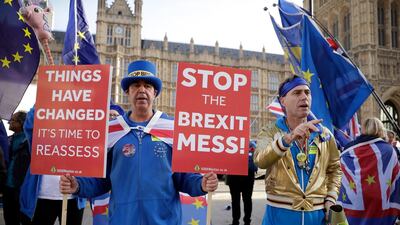British Prime Minister Theresa May was battling to secure the backing of her cabinet for the exit deal with Brussels that would see the country leave the European Union on March 29 next year.
The agreement between Britain and the remaining 27 states in the bloc would see Britain temporarily operate a custom union with the EU and thus avoid a border of checkpoints on the island of Ireland until an trade deal was reached. Britain will also have a transition period until the end of 2020 in which it will have full access to EU markets.
Politics in Britain are dominated by the siren voices that either want a clean break or a reversal of the 2016 result. The government is faced with a strengthening campaign to run a second vote on the issue, spearheaded by the former prime minister Tony Blair, who attacked the deal on Wednesday. “Nothing can disguise the nature of the deal [Mrs May] has chosen, if reports of it are true,” he said. “This deal isn’t a compromise, it’s a capitulation.”
Mr Blair acknowledged that he was in "unholy alliance" with Brexiteers such as Boris Johnson to stop a compromise outcome.
But Mrs May vowed to deliver her negotiated outcome. “We will not re-run the referendum, we will not renege on the decision of the British people,” she said.
The critics range from the Northern Irish allies of her government, the hard-line anti-EU faction of her party and the official opposition, Labour. Concerted and organised opposition to the deal is likely throughout a process in which it must be approved by parliament as well as the other Europeans.
Jeffrey Donaldson, of the Democratic Unionist Party, which is propping up Mrs May’s government after she called a disastrous snap election last year, said that his party would not be backing the deal.“This deal has the potential to lead to the break-up of the United Kingdom and that is not something we can support,” he said.
Sammy Wilson, the party’s Brexit spokesman was blunt, warning the 10 DUP MPs that prop up Mrs May’s minority government would resist pressure from the “great and the good” to back the deal. “We are clear — we will not be voting for this humiliation!”
A former leader of the ruling Conservative Party, William Hague, said that a second referendum would be "the most divisive and bitter political conflict in this country in 100 years, and very economically damaging". The government has repeatedly ruled out a second vote on the outcome of the referendum that ‘leavers’ won by 52 per cent to 48 per cent.
Mr Hague said the DUP could have to face the fact that Brexit might never happen if it didn’t sign up to Mrs May’s settlement deal.
_____________
Read more:
Pound rallies ahead of May's push to sell newly minted Brexit deal to ministers
Britain and EU agree Brexit deal
_____________
The Conservative Party’s chief whip Julian Smith said told colleagues he is confident the deal can pass when put to a crucial Commons vote, despite the strident opposition. “We’re hopefully on the cusp of beginning to get to the point where we're delivering on Brexit in a really practical way,” he said.
However the BBC's political editor Laura Kuenssberg tweeted late on Wednesday that a senior Conservative MP had told her that Brexiteer anger about the deal was so high that “it seemed likely there will be a call for no-confidence vote tomorrow” and that letters demanding a leadership contest were being submitted.
The IMF endorse a deal along the lines proposed by Mrs May, forecasting that Britain could grow faster than the current expectation of 1.5 per cent growth next year if there is a guarantee of frictionless trade with the European Union.
However the IMF also warned that a no-deal Brexit in which Britain crashed out would wipe out around 6 per cent of GDP and prove particularly damaging for the financial sector in the City of London.
The uncertainty is bearing down on thousands of businesses, which have been unable to prepare for the post-Brexit climate. In Dover, the town nearest France and its most significant cross-channel port, there were calls for the government to resolve the issue once and for all.
Tim Dixon, general manager of Motis FSA, a company that provides customs clearances for lorries leaving the port for destinations outside the EU, said the issue was pressing. “I think everyone knows what the worst case scenario is - the ports coming to a grinding halt,” he said. “We all need to prepare, but training-wise, extra staff-wise, no one is willing to stick or twist, not until they know what is going to happen.”
Nonetheless the anti-EU Conservatives were adamant that the deal should be rejected. David Davis – who once led Mrs May’s Brexit strategy, but quit over the direction of negotiations – said: "Cabinet and all Conservative MPs should stand up, be counted and say no to this capitulation."
Jacob Rees-Mogg hinted he would not be seeking to oust Mrs May in the next 24 hours, leaving the option open for a coup in the short-term.
Senior figures in the opposition Labour Party indicated that it would not support the government’s Brexit deal and kept the door open to the possibility of a second referendum.
The Irish prime minister Leo Varadkar said in his view the agreement would provide a so-called backstop, preventing customs controls between the two parts of Ireland. “It is our intention that the backstop should never have to be invoked and if it is invoked it should be temporary,” he told his own parliament.


